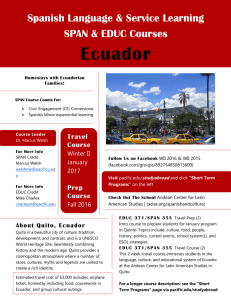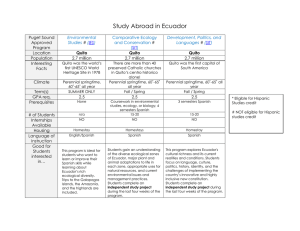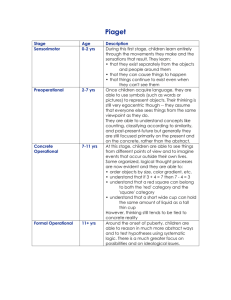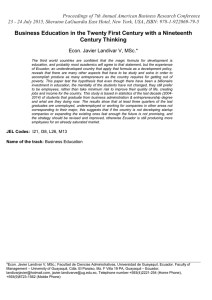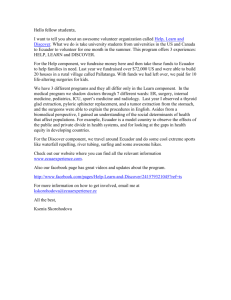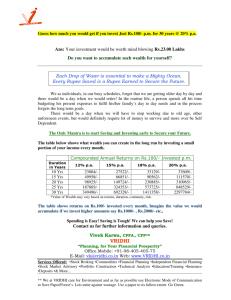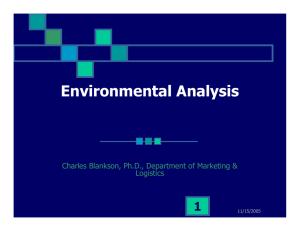The History & Culture of Ecuador Friday, September 22, 2006 4.170/4.171
advertisement
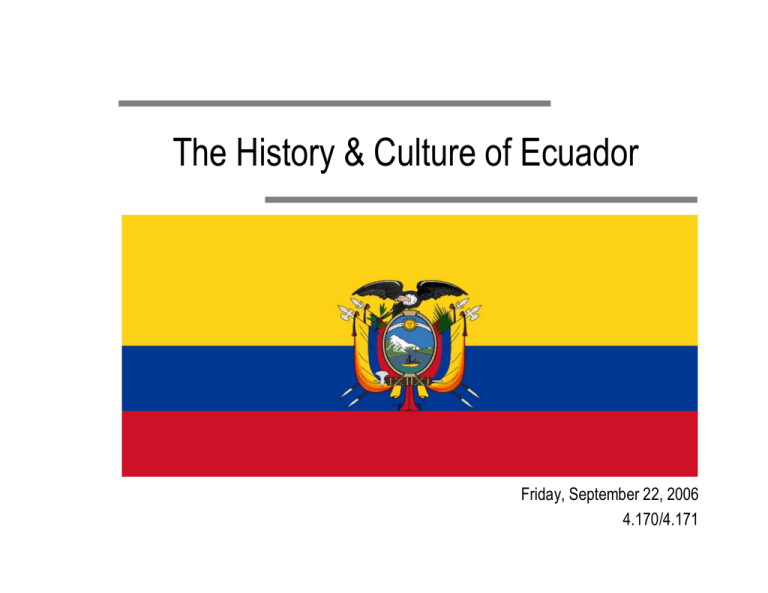
The History & Culture of Ecuador Friday, September 22, 2006 4.170/4.171 Pre-history to Colonization 16,000 – 18,000 yrs ago First Native Americans arrive: Chorrera, Machalilla, Bahia, La Tolita, Tuncahuan, etc. 1463 Inca warrior Pachacuti & his son Topa Yupanqui begin conquering Ecuador 1531 Spanish conquistadors under Francisco Pizarro arrive “Encomienda” labor system 1563 Quito becomes the seat of a royal audiencia (administrative district ) of Spain (Audience of Quito) Struggle for Independence July 1808 Napoleon invades Spain, places brother on the Spanish throne Creole resentment of peninsulares August 10, 1809 Quito’s leading citizens set up a Junta & seize power August 1810 Quito governed by a Creole junta December 1811 Junta declares independence, but rebellion is crushed Struggle for Independence October 1820 Guayaquil junta declares independence Simon Bolivar Palacios (Venezuelan) & Jose de San Martin (Argentine) May 24, 1822 Victory at the Battle of Pichincha, but Quito becomes part of Colombia & Guayaquil is annexed May 1830 State of Ecuador constitution General Juan Jose Flores Struggle for Stability 1830s-1940s Rise & end of cocoa boom leads to instability 1948-1960s Growth of banana industry leads to prosperity & peace 1970s Discovery of oil in the Amazon Industrialization, land reform 1981 Paquisha Incident, Peru/Ecuador border dispute Economic crisis: inflation, mounting debt, etc. Struggle for Stability 1984 President introduces free-market economic policies, pursues close relations with US Kidnapping by military March 1987 Earthquake worsens economic problems 1988 Ecuador opened to foreign trade, fight against terrorism 1992 Modernization initiatives Vice president flees country on corruption charges Struggle for Stability 1996 President deposed for alleged mental incompetence June 5, 1998 New constitution drafted October 26, 1998 Peace w/ Peru Dollarization – lower classes lose, upper classes win January 21, 2000 Demonstrators enter National Assembly and declare a 3 person junta in charge of the country Struggle for Stability January 15, 2003 Retired Colonel Lucio Gutierrez (member of junta) becomes president April 2005 President Gutierrez is overthrown after unconstitutionally dissolving the Supreme Court (and appointing new judges) Ecuadorian Armed Forces “withdraws support” & Gutierrez flees Politics Presidential Representative Democratic Republic Executive – President Alfredo Palacio z Legislative z 4 yr Presidential term 100 member Congress Judicial Factionalism Weak Party discipline Strong indigenous population (since 1996) Demographics 65% Mestizos (mixed Spanish & Amerindian) 25% Amerindians 7% Criollos (unmixed descendents of Spanish colonists) Afro-Ecuadorians, migrants from Peru & Colombia Education Not tuition-free, but mandatory from ages 6-14 In rural areas, only 1/3 complete 6th grade Enrollment in primary schools increasing 4.4% per year (faster than population growth) Public universities have open admissions policy Budget shortages, over population & extreme politicization has led to recent decline Interesting Points January 2, 1980 China & Ecuador formally establish diplomatic relations In 100 yrs, shift from the Sierra (central highlands) to the Costa (coastal lowlands) There is tension & dislike b/t residents of Quito and Guayaquil Ecuador’s official motto until 1999: “El Ecuador ha side, es y sera Pais Amazonico” Ecuador vs. United States Population: 13,547,510 Age Structure: 0-14 yrs: 33% 15-64 yrs: 61.9% 65+ yrs: 5% Median Age Total: 23.6 yrs Male: 23.1 yrs Female 24 yrs Population Growth Rate 1.5% Population: 298,444,215 Age Structure: 0-14 yrs: 20.4% 15-64 yrs: 67.2% 65+ yrs: 12.5% Median Age Total: 36.5 yrs Male: 35.1 yrs Female: 37.8 yrs Population Growth Rate .91% Ecuador vs. United States Birth Rate: 22.29/1000 Death Rate: 4.23/1000 NMR: -3.11/1000 Life Expectancy: 76.42 HIV/AIDS: 0.3% Religion: 95% Roman Catholic Literacy: 92.5% Birth Rate: 14.14/1000 Death Rate: 8.26/1000 NMR: 3.18/1000 Life Expectancy: 77.85 HIV/AIDS: 0.6% Religion: 24% Roman Catholic Literacy: 99% Culture Family structure Importance of family Civil Marriage, Religious Marriage, Free Union Sports Soccer: Ecuador reached knock-out round in Germany Volleyball Bull fighting Fishing Culture Food Costenos: fish, beans, plantains Serranos: meat, rice, potatoes Patacones: unripe plantains fried in oil, mashed, refried Llapingachos: potato tortillas Seco de chivo: goat stew Beef jerky from charqui (Quechua) Language Spanish Kichwa (Ecuadorian dialect of Quechua)
